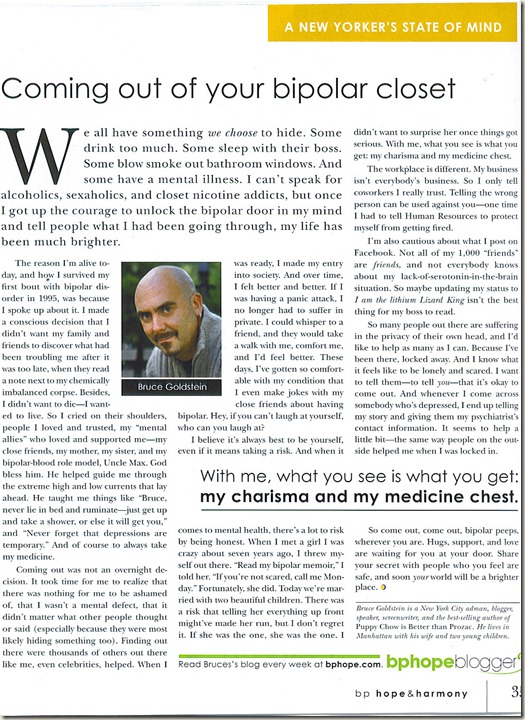The following is an excerpt from an article in the Summer 2012 edition of Esperanza magazine. I found it a very positive message for those of us given to depressive episodes. I believe you will enjoy it!
Depression corrodes your self-confidence. Low self-esteem worsens depression. Two good reasons to learn how to build yourself back up.
by Jodi Helmer
Shari M. believed that happiness would come when she reached a certain rung on the corporate ladder. To get there, she logged 70 hours per week as an IT project manager in Minnesota, often forgoing sleep to meet deadlines.
She wasn't just logging overtime at work: She had a newborn son and household responsibilities. She had a lot of support from her husband, she cut back on seeing friends, she gave up her hobbies, but Shari still didn't have time for everything on her overwhelming to-do list.
"I had so many goals and dreams, and I started feeling sorry for myself because I wasn't reaching them," recalls the 44-year-old. "I felt like I wasn't worth as much because I couldn't get it all done."
Exhausted, emotionally fragile, and plagued with headaches and back pain, Shari was diagnosed with depression in 2007. She was prescribed antidepressants and also went to counseling, where she realigned her priorities.
She left her six-figure job in the tech sector to start a new business. She was feeling better and having fun with her start-up. Then her business failed and her self-esteem plunged.
"I was used to things going well and being very successful in life," recalls Shari, whose depressive symptoms resurged. "When the business failed, I felt like a failure."
Self-worth and depression have a symbiotic connection. Kevin Solomons, MD, a clinical associate professor of psychiatry at the University of British Columbia, sees "self-esteem failure" as a key component of the illness.
"If you think of yourself as worthless and hopeless, the emotion that corresponds is unhappiness and misery," explains Solomons, who studies the psychological effects of low self-worth.
Meanwhile, the inability to achieve what you'd like, perform as you used to, or even complete everyday tasks because of depression can lead to or strengthen feelings of hopelessness and worthlessness.
"Depression affects how we make decisions, respond to events and interactions, feel about successes and failures, affecting everything we do from the time we wake up until the time we go to sleep," says clinical psychologist Dennis Greenberger, PhD, co-author of
Mind Over Mood: Change How You Feel by Changing the Way You Think. Greenberger notes that feelings of worthlessness that flow from depression can in turn intensify depressive episodes. By the same token, however, the mutual influence applies to treatment as well.
"There is an interplay among mood, thinking, neurochemistry and behavior, and we know that when you change any one of these areas, the others almost always follow suit," Greenberger explains.
"So, if you change your thoughts through cognitive therapy, you're likely to see an improvement in mood and self-worth, and if you change your neurochemistry through medication, it's likely to improve your mood."
Mission critical
Science has recognized the association between depression and self-worth for quite some time. A study published in
Annals of General Hospital Psychiatry in February 2003 noted a "vicious cycle" between low self-esteem and the onset of psychiatric disorders, including depression. The University of Alberta researchers reported that patients with major depressive disorder expressed the lowest levels of self-esteem.
Low self-esteem also increased vulnerability to major depression and adversely affected its prognosis, they found.
For Chuck Bennett (not his real name), no amount of achievement was enough to make him feel good about himself. He attributed his success as a marketing director for a high-profile publishing company to the talents of his staff, never taking credit for his own hard work.
Convinced of his own inferiority, he felt like a fraud.
"I was seen as ambitious, heading up projects, but I felt like I didn't deserve the position I had. I felt worthless," he says. "I'd push, push, push, thinking if I could just accomplish this one thing, it would get better."
Initially diagnosed with depression in his 20s, Bennett went into denial mode. Embarrassed to have a psychiatric illness, he didn't pursue treatment. Instead, he poured himself into his work, spending as many hours as possible at his downtown Chicago office.
"I became a workaholic and when I started feeling depressed, I would either work harder or party harder, anything to keep me busy and take the focus off of how badly I felt," recalls Bennett, 49. "I became a robot, living on autopilot because I didn't know how to cope with the emotions and anxiety and stress."
Bennett finally reached a point where the self-critical feelings, forgetfulness, lack of energy, and crying jags all became too much. He started therapy in 2004.
"I went from feeling like I was broken and no one could fix me to having the guts to take the steps to get better," he says.
Seeking out help may be the first step in rebuilding self-worth, says Margaret Wehrenberg, PsyD, clinical psychologist and author of
The 10 Best-Ever Depression Management Techniques: Understanding How Your Brain Makes You Depressed and What You Can Do to Change It.
"You may have the ability to tackle a problem but you won't take action without encouragement," she says. "When you're depressed, you can't always hear your own negativity. Therapy can help generate new ways of thinking."
Bennett learned in therapy about the link between low self-esteem and depression. He practices recognizing destructive thought patterns and assessing whether there is a realistic foundation for his doom-and-gloom thinking.
He keeps a journal where he can work through upsetting experiences and track his progress. Deep breathing and mindfulness help him cope with anxiety.
Despite counseling and medication, however, Bennett's deep-seated depression persisted. He decided to take a medical leave from his high-stress job in 2011, then went on disability a few months later. Although he is grateful for the time to focus on healing, he admits that not being able to work was a further hit to his vulnerable self-image.
Learning to see depression as an illness, not a character flaw, has given him another tool to defuse his self-criticism.
"I finally realized that if I didn't accept that depression was a disease, I couldn't begin to get through it," he explains. "I have to tell myself every day, 'You have a disease, lighten up on yourself.'"
Positive power
"The idea of being worthless is a thought habit, and unless you recognize old habits, you can't change them," Solomons points out. "Cognitive behavioral therapy helps identify self-defeating thought patterns, offers a more realistic way of thinking, and lets you rehearse different ways of dealing with situations."
Shari says those principles had "a profound impact" on her recovery after her business failed, her depression rebounded, and she began to have panic attacks.
"I was relying on two depression medications to make it through the day and not just curl up in a ball in my bed," she recalls.
This time, Shari recognized that she needed to reframe her thoughts rather than rearrange her life. She turned to a business transformation coach trained in a positive self-improvement technique.
"I now understand that, 'What we think about, we bring about,'" she explains. "The more I felt sorry for myself, the sorrier my life got."
Shari began repeating affirmations and practicing mindfulness. When negative thoughts popped into her head, she told herself, "This thought doesn't serve me well. What could I think instead?"
"I became conscious of my thought patterns, reversing the negative self-talk and practicing more positive ways of responding, and it began to change my state of mind," she explains.
Solomons suggests rehearsing responses to various scenarios like an actor rehearsing a script, asking, "How would someone with high self-esteem deal with the same situation?"
"You're the author of your own views about yourself and you have the power to rewrite them," he says.
That's gospel truth for Shari, who found another job as an IT project manager and stays focused on better work-life balance. In fact, she wrote a book about time management.
"I'm on top of the world," she says. "I see that life is a choice instead of a series of circumstances happening to me."
Goal oriented
Setting and achieving goals is also essential to overcoming depression, boosting positive feelings, and rebuilding self-esteem.
"When you're depressed, you don't tend to see your accomplishments as valuable and feel no sense of power or control over your life," says Wehrenberg. "When you can't see what your value is, you can't easily see solutions to problems."
Wehrenberg suggests picking small goals—sorting the laundry, walking around the block, writing a grocery list—and choosing a reward for accomplishing them.
"It works because the amount of energy you have when you're depressed is so limited," she explains. "People often discount the importance of taking a small step, but every time you take an action in a positive direction, you feel better."
Kendra F. was pursuing two big goals—a degree in forensic psychology and a position on Canada's national women's hockey team—when she started experiencing heart palpitations, dizziness, stomach pain, insomnia and trouble concentrating.
Instead of racing between the classroom and the rink, Kendra spent increasing amounts of time alone in her Toronto apartment.
"I had the whole world going for me and all I wanted to do was lie on the couch and not deal with anything," recalls Kendra, 32.
Kendra saw a cardiologist, a neurologist and a gastrointestinal specialist. After each exam, the doctors told Kendra she was in perfect health.
It was only after Kendra's symptoms drove her from the Team Canada tryouts in 1999 that someone from the hockey program suggested she see a psychologist. Shortly after that, Kendra was diagnosed with depression, anxiety disorders and agoraphobia.
Kendra stopped seeing friends and dropped out of school. Her sense of self-worth eroded as she began to believe she could never get her degree or succeed in the sport she loved.
"I had this entire life mapped out, I was working toward my dreams and quite successful, and then it all disappeared when I was diagnosed with depression and anxiety," Kendra says.
"I had zero faith I'd be able to get through it and I gave up. I thought if I didn't try, I couldn't fail and I hoped not failing would alleviate the depression."
Kendra says she resisted both her diagnosis and treatment for nearly five years. Finally, she says, "I got to a point where I needed to believe there was more to life. I became more actively engaged in my recovery, reset the expectations, and learned to recognize my achievements and started to build on them."
At the suggestion of her therapist, Kendra started setting small goals and allowed herself to feel successful for meeting them.
"I used to live a very extreme life where everything was win or lose and I wasn't used to feeling like I could accomplish some things but not everything," she explains.
Kendra congratulated herself for preparing healthy meals, tackling household chores and running errands—all activities she took for granted before her diagnosis. Although it seemed silly to be celebrating such small achievements, Kendra says, she did feel a sense of accomplishment for making progress.
Today, Kendra is a director of business development for a staffing company, plays inline hockey for Team Canada and regularly speaks at schools, nonprofit organizations and corporations to help reduce the stigma of mental illness.
"I wake up happy, with energy and focus, and I'm not afraid to dream," she says.
-----
Jodi Helmer is a freelance writer based in Charlotte, North Carolina. Her work has appeared in Shape
, Women's Health
, Family Circle
and other national magazines.










